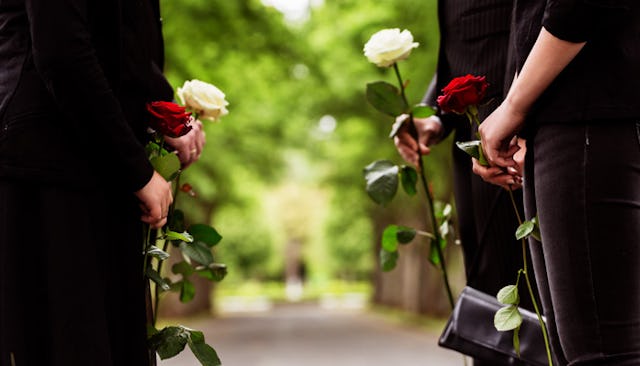Three Funerals And A Wedding

The movie Four Weddings and a Funeral came out the year I graduated from college, and I distinctly remember wanting to jump through the screen and be transported directly into that world. It was a place where somewhat awkward British singles were navigating the complex world of love and loss, all while attending lavish social occasions and overnighting in castles and pubs. This was Hugh Grant at his quirky, bumbling, finest pre-Divine Brown self, surrounded by a group that blurred the lines between friends and family. It seemed, at the time, to be the perfect portrait of a group of ordinary people dealing with the extraordinary burden that can only come from genuine love and heartache.
Fast-forward more than two decades, and I am happily married to my very own floppy-haired dreamboat with no scandals that I’m aware of. We have three children we love; a large, loud, extended family that brings us immeasurable joy and just enough crazy to keep things interesting; and a circle of friends, both old and new, we can count on for both laughter and support. If I had to sum it up in movie terms, I’d say our life is My Big Fat Greek Wedding–Egyptian version meets Steel Magnolias–Midwestern edition, with heavy notes of Toy Story drizzled on top.
But last week, my wish to dive into Four Weddings and a Funeral almost became a reality, just backwards. In one of life’s stranger plotlines, I found myself having to attend three funerals and a wedding, all within the span of five days. First, I heard of the passing of my friend’s mother, who had been quite ill for some time. Then, two days later, another friend’s mother was laid to rest after a brave battle with Alzheimer’s. The next day, I learned that a former colleague had lost his wife. I became fearful of even logging into Facebook, since my newsfeed seemed to be stuck on heartbreak mode.
To say the week was a bit strange is like saying Gigli was a bit of a bummer. I’d spend a typical summer day with the kids, delivering them to swim practice, vacation Bible school and the like, scramble to get my own work done, and then quickly shed my mom uniform of shorts and a T-shirt for a simple black dress the minute my husband came home. As I headed out to watch two daughters, now moms themselves, say a final goodbye to their own mothers, my eyes filled with tears as my own little girl hugged me tightly and said, “Come right back, Mama.”
In one of the most bizarre moments of the whole week, we actually stopped at the third funeral on the way to the wedding. Within the span of one hour, we witnessed one man promise to love, honor and cherish until death do they part, and another one grieve that he had done just that. It was a circle of life that would leave even Mufasa, in all his Lion King glory, feeling dizzy.
As my husband and I sat, hand in hand, at the wedding, it occurred to me that I haven’t actually been to very many funerals in my life. My grandparents and other close relatives died overseas. My parents lost close friends as I was growing up, but the funerals were always adult affairs—not something often discussed around kids. I come from a culture that is very good at celebrating love. We love love, as was evidenced by the 500-plus people (an average-sized crowd for our people) who gathered to eat, drink and be very merry alongside the bride and groom. From heaping platters of food to live music and belly dancing, we are very good at weddings, not to mention engagements, bridal showers, baby showers and random Thursday nights. But loss? That one we struggle with.
In recent years, I’ve been to funerals described as “Celebrations of Life.” It’s a difficult concept for me to understand, because when the cloud of grief descends over our community, everything grows dark. There is not a lot of laughter or light, and there is certainly no celebration. In the funeral homes, there is often silence, punctuated only by weeping and fervent recitation of prayer. Widows and close family members of the deceased will traditionally wear all black for one full year after their loved one’s passing, and sometimes for the rest of their lives. Perhaps when you love with every ounce of your being, the loss of that love leaves too deep a wound to ever close. But is there a way for love and loss to coexist?
The poet Rumi believed that sorrow and joy were deeply intertwined. He wrote, “Sorrow prepares you for joy. It violently sweeps everything out of your house, so that new joy can find space to enter. It shakes the yellow leaves from the bough of your heart, so that fresh, green leaves can grow in their place. It pulls up the rotten roots, so that new roots hidden beneath have room to grow. Whatever sorrow shakes from your heart, far better things will take their place.”
I thought about that quote the day after the final credits rolled on my three funerals and a wedding. That morning, I attended church with my family, after which my youngest insisted we light a candle. I held his hand, and together we dipped the long match into the flame of an already lit candle and touched it to a new wick. I watched his face light up as he saw it spring to life, the back-and-forth, in-and-out flickering all reflected in his warm, brown eyes. It was like that instant your favorite movie comes to life on the big screen, or the moment it fades away. The place where ever so briefly, light and darkness dance together.
This article was originally published on